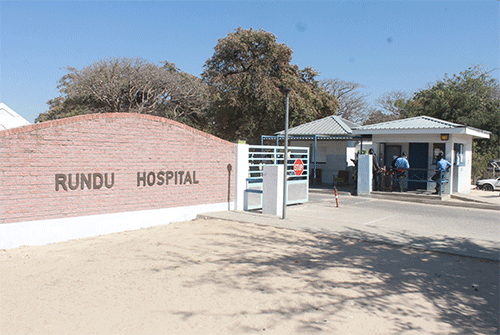RUNDU – From personnel shortages to lack of ambulances and medical equipment, the Rundu Intermediate Hospital faces an uphill battle in its quest to provide quality services.
These revelations were made by hospital superintendent Dr Jean Kalala Kabangu during a visit by the parliamentary standing committee on health and social welfare on Monday.
Despite recently being given the status of an intermediate hospital, the upgrade was never accompanied by a requisite staff complement to cater for the new functions.
“In the past, Rundu operated as a district hospital, and now it’s an intermediate hospital. As an intermediate hospital, we need to provide some specialised services, and for that we need to have specialists in various departments.
But the challenge is how to attract those specialists. You know Rundu is considered a remote area, and then even if we attract them, how do we retain those specialists? So, there is a need to attract and retain them. It is not only specialists, but all other cadres needed in the hospital,” Kabangu elucidated.
The health official mentioned a number of push factors affecting specialists’ retention.
“[There are things] like the limited private practice for specialists as well as improved equipment, because you cannot get a specialist who will come here and sit and not perform. They will lose their skills, and probably that is one of the reasons they don’t want to come here,” he emphasised.
Overtime
There is more.
“At the new maternity and neonatal wards, the staffing also did not go along with the new facility. We have a critical shortage, meaning the staff establishment needs to be improved so that we reach the level where there should be staff allocated to those wards or facilities to provide quality care,” Kabangu said.
“The shortage of staff is pushing us to make our staff work overtime, and we have limited resources when it comes to overtime. [So], until the staff establishment is revised to fill or create the number of positions, we will be going through the issue of overtime,’’ he continued.
Kabangu stated: “In Kavango, we have a number of mental disorder cases, but we don’t have a mental health facility. We thus need to at least have some facilities when it comes to mental health to improve our infrastructure to provide quality care.”
Reports have suggested that around
3 000 patients seeking mental health services from the two Kavango regions and Zambezi are catered for by the Rundu Intermediate Hospital.
Despite this, communities, including politicians in Kavango West, have rejected the ministry’s idea of transforming the Nankudu District Hospital in Kavango West into a mental health hospital to meet the overwhelming demand.
The hospital has managed to recruit a number of doctors, and for now they have 42 medical doctors, inclusive of junior and senior medical officers. They also have eight specialists, covering various departments. “Yes, the shortage is still there, but the challenge is the recruitment process for specialists. Namibian specialists are not willing to come and work in Rundu, and now we make use of foreigners. The process of employing them is quite cumbersome, but most of the departments are covered, with some challenges with the paediatric department, where we only have one paediatrician. For obstetrics and gynaecology, we also have one specialist, but we are in the process of recruiting,’’ he added.
Shortage
The Rundu Intermediate Hospital is likewise challenged with a shortage of transport.
Its ageing fleet includes eight ambulances, of which only three are operational.
“We have engaged our ministry for new ambulances to be purchased. We’d be happy if we could get four off-road [4×4] ambulances and four Quantum [mini-bus] ambulances, but we know it’s a long and costly process. However, we expect to get them when the ministry procures,’’ he noted.
Collective
In addition, the medical doctor pleaded with other stakeholders in the region that the provision of healthcare services should not be left to government alone.
Kabangu then urged the lawmakers to address laws which make the procurement of medical equipment a cumbersome exercise.
He also lamented the fact that the government’s regional medical store is always short of medication.
“The level of service is said to be poor, as they are always out of medication to supply health facilities in the two regions,” he reiterated.
On behalf of the parliamentary standing committee, its chairperson Hans Nambodi said “the main purpose of us coming here is to visit the facilities of the ministry of health, to assess these facilities, to see if there are enough ambulances, medical equipment and a staff complement, along with medicines, and also to inspect the infrastructure.”
The lawmaker added: “We paid attention to their challenges, we took note. Afterwards, we will complete the report, which we will go and table in the National Assembly as well as engage the National Council and deliberate on the matters, and seek a solution with the ministry.”



